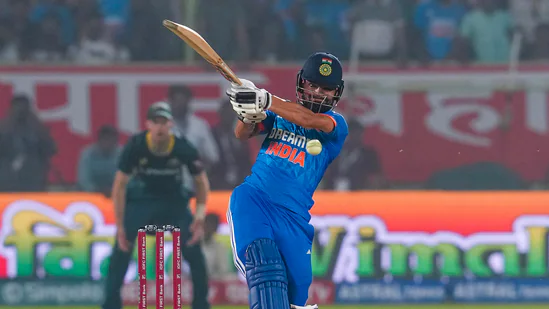Rinku Singh‘s six on the last ball to secure India’s win in the 1st T20I against Australia won’t be officially recorded in the score due to certain circumstances.
The World Cup concluded with heartbreak for India last Sunday, but excitement continued in the shortest format with a thrilling finish in India’s first T20I against Australia on Thursday in Visakhapatnam.
Australia scored a strong 208/3 in 20 overs, with Josh Inglis making an impressive 110 off 50 balls. Captain Suryakumar Yadav and Ishan Kishan’s excellent batting brought India close to winning, but their dismissals created tension.
The penultimate over from Nathan Ellis, allowing only 6 runs, added excitement to the match until the end. India had the advantage, needing 7 runs off the final over. Rinku Singh hit a four off the first ball from Sean Abbott, reducing the requirement to 3 runs off 5 balls.
Although he missed connecting on the second ball as Abbott adjusted his length, Rinku still managed a single as wicketkeeper Matthew Wade fumbled in collecting the ball.
Requiring 2 runs off 4 balls, Axar Patel tried to hit the ball but didn’t connect well, leading to a mistimed shot. Sean Abbott caught the ball comfortably, dismissing Axar and bringing spinner Ravi Bishnoi to the crease. Bishnoi missed the connection with the ball on the third delivery, attempting a hook shot.
However, Rinku Singh, anticipating the situation, sprinted as soon as Abbott bowled. While this allowed Rinku to regain the strike, it resulted in Bishnoi being run out at the other end.
Rinku hit the penultimate delivery towards deep midwicket, attempting a second run. Although he reached the crease safely, Arshdeep couldn’t make it to his end in time, resulting in a wicket for India.
Why wasn’t Rinku Singh’s last-ball six considered valid?
Rinku Singh sealed the win with a satisfying six over long on when only one run was required off the last over.
However, the joy was short-lived as the six wasn’t counted due to a confirmed no-ball by the third umpire, making the hit irrelevant to India’s total and Rinku’s personal scoresheet since India had already won the match.
What are the ICC’s Playing Conditions or, in simpler terms, the rules?
According to ICC Men’s T20I Playing Conditions 16.5.1: “As soon as a result is reached as defined in clauses 16.1, 16.2 or 16.3.1, the match is at an end. Nothing that happens thereafter, except as in clause 41.17.2 (Penalty runs), shall be regarded as part of it.”
Rinku’s six would have been valid if India needed more than one run to win, as Abbott’s no-ball would have, at most, equalized the scores, keeping the match alive.
“If a boundary is scored before the batters have completed sufficient runs to win the match, the whole of the boundary allowance shall be credited to the side’s total and, in the case of a hit by the bat, to the striker’s score.”
Get the latest cricket news here, like us on Facebook, and follow us on Twitter and Instagram for more such updates.

